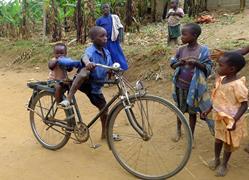PhD student, Centre of Development Studies, Smuts research grant recipient
"In spite of the way my house is I am grateful and happy that it is mine.” Rural voices: initial thoughts about a household survey in Eastern Province, Rwanda
Hearing the voices of the poor in Rwanda is moving, inspiring – and in my view, essential for the validity of a study related to the effectiveness of a development strategy. I am studying a policy of the Government of Rwanda – to secure ‘financial inclusion’ for at least 80% of the population by 2017. I am looking at the purpose of the policy, its appropriateness – and ultimately its impact. Even if the policy is effective in delivering the intended changes, it is important to find out whether those changes bring life chances that are valued – and to ensure that the direction of change in Rwanda is largely positive for its population.
When prompted to explain, those interested in financial inclusion within the Rwandan system give a very consistent definition of financial inclusion. There are three elements: (1) Proximity to services; (2) Appropriateness of services; (3) Ability to make informed decisions about those services (often called financial literacy).
Each of these elements can present problems to the poor in rural areas. Financial services may not be close by, service providers may struggle to develop good services when the immediate demand is low, and educational services may also be weak. For these reasons, I wanted to learn more about the reality of daily lives – and finances - in rural areas.
We visited four villages (randomly selected across the Eastern Province of Rwanda) and interviewed 35 randomly chosen households in each. The clarity of many of the responses is striking. We asked people to start by telling us what, in their view, could be considered a good kind of life. Thereafter, we asked them to tell us about their actual lives: the positives and the negatives. Only then did we start to drill into finances – and the use of financial services.
At this stage, the detailed analysis has not even begun. So I am only able to share the voices: the power of those who are brave and optimistic about their lives; the simplicity of what is regarded as a good kind of life; and the sadness of those who feel themselves far from achieving even their modest desires. The following quotations are all from one young couple in Gatsibo District who answered the survey together. Let them speak for themselves!
“In my opinion someone who has a good life is the one who has enough to eat – he is not starving. He eats two times a day – the food that comes from his own field. He has good clothes and shoes, and his children are in education. He has somewhere to sleep, and he has a mattress. He has livestock so his children get milk.
“I think someone who has a bicycle, a motor cycle or a car has a good life. Because actually the head is to think, not to carry things.
“One challenge in our life is that we lack manure and the harvest reduces. When things go well we manage to get enough to eat – but we find nothing over to take to market.
“A good thing in our life is self-respect. We do not cheat anyone. We do not beg. When there is an issue we solve it peacefully, asking each other’s forgiveness."

